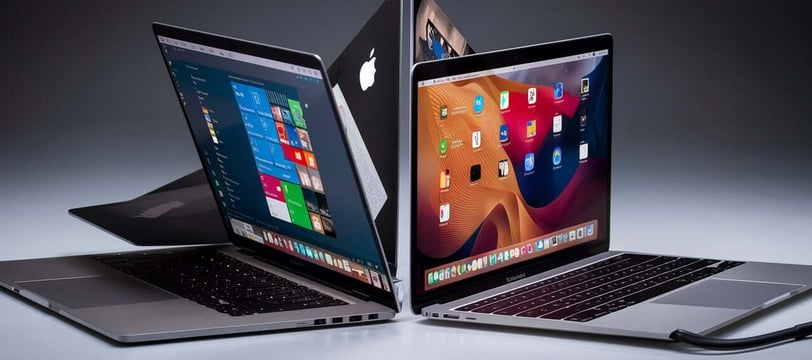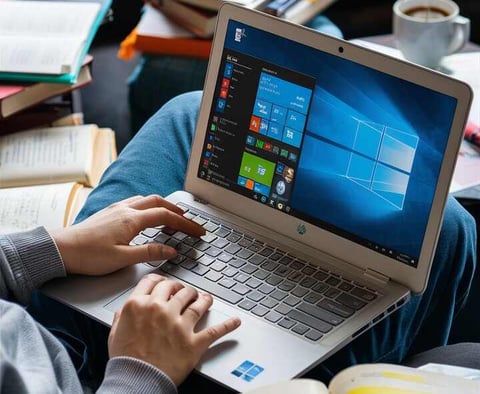MacBook vs. Windows: Which Is Better for Office Work and College Students?
Discover the ideal laptop for office work and college students. Compare MacBook vs. Windows laptops for design, performance, and productivity. Make an informed choice today!
TECH GUIDE
SK Moniruddin
7/4/20246 min read


Choosing the right laptop is a critical decision for both office work and college life. With countless models and configurations available, the debate often narrows down to two main contenders: MacBook and Windows laptops. Each has its unique strengths and potential drawbacks. This article aims to provide a comprehensive comparison to help you decide which is better suited for your needs.
Design and Build Quality
MacBook:
Apple's MacBook series is renowned for its sleek design and premium build quality. The aluminum unibody construction not only looks sophisticated but also feels robust and durable. MacBooks are also lightweight and slim, making them highly portable — an essential feature for students and professionals on the go.
Windows:
Windows laptops come in a variety of designs, ranging from budget-friendly plastic builds to high-end metal constructions that rival the MacBook. Brands like Dell, HP, and Microsoft Surface have made significant strides in design and build quality, offering aesthetically pleasing and durable options. However, the sheer diversity means there can be inconsistencies in build quality across different models and price points.
Operating System and User Experience
MacBook:
MacBooks run on macOS, known for its smooth, intuitive interface. The operating system is optimized for performance and stability, offering a seamless experience with minimal lag or crashes. macOS also integrates well with other Apple products and services, making it an excellent choice for those already embedded in the Apple ecosystem. Features like Spotlight for search, Mission Control for multitasking, and the robust suite of built-in apps (e.g., Pages, Numbers, Keynote) enhance productivity.
Windows:
Windows laptops operate on Windows 10 or Windows 11, which provides a familiar and versatile environment. Windows OS is highly customizable and supports a vast range of software, making it suitable for various tasks from basic word processing to complex data analysis. The interface has improved significantly with Windows 11, offering a more modern look and feel with features like Snap Layouts for better multitasking. Windows also excels in compatibility, supporting an extensive array of peripherals and applications.
Performance
MacBook:
MacBooks, especially the newer models with Apple's M1 and M2 chips, deliver outstanding performance and energy efficiency. These chips provide excellent speed and power management, making MacBooks capable of handling demanding tasks like video editing and software development while maintaining long battery life. The integration of hardware and software in MacBooks ensures a smooth, responsive experience.


Windows:
Windows laptops offer a wide range of performance options, depending on the configuration. High-end models equipped with Intel Core i7 or i9, AMD Ryzen, or NVIDIA GPUs can rival MacBooks in performance, making them suitable for intensive tasks such as gaming, 3D rendering, and scientific simulations. However, budget models may not perform as well under heavy workloads, so it's crucial to choose a configuration that meets your specific needs.


Software and Compatibility
MacBook:
MacBooks come with a suite of productivity software, including the iWork suite and various creative tools like GarageBand and iMovie. For professionals, macOS supports industry-standard software such as Adobe Creative Cloud, Microsoft Office, and more. However, some specialized software, particularly in fields like engineering and architecture, may not be available or fully optimized for macOS, necessitating alternatives or virtualization solutions.
Windows:
Windows excels in software compatibility, supporting a vast library of applications across all fields. Whether it's Microsoft Office, Adobe Creative Suite, AutoCAD, or gaming titles, Windows laptops can run almost any software you need. This makes Windows a versatile choice for both students and professionals who require access to a broad range of applications.
Security
MacBook:
Apple places a strong emphasis on security and privacy. macOS includes robust built-in security features such as Gatekeeper, which prevents unverified software from running, and FileVault, which offers full-disk encryption. Regular updates and a closed ecosystem help protect against malware and security threats.
Windows:
Windows has made significant improvements in security with features like Windows Defender, BitLocker, and regular security patches. However, the open nature of the platform can make it more susceptible to malware and cyber attacks. Users need to be diligent about installing security software and keeping their systems updated.
Cost and Value
MacBook:
MacBooks are generally more expensive than their Windows counterparts. The higher price reflects the premium build quality, performance, and ecosystem integration. For those who can afford the investment, a MacBook offers long-term value through its durability and strong resale value.
Windows:
Windows laptops offer a broader range of prices, from budget models to high-end machines. This makes it easier to find a laptop that fits your budget. While cheaper models may not match the performance and build quality of a MacBook, they can still offer good value for money, especially for basic tasks.
Conclusion
Choosing between a MacBook and a Windows laptop ultimately depends on your specific needs and preferences. If you prioritize design, build quality, and seamless integration within an ecosystem, a MacBook is an excellent choice. Its performance, security features, and user-friendly interface make it ideal for both office work and academic pursuits.
On the other hand, if you need a versatile machine with extensive software compatibility and a range of performance options, a Windows laptop might be the better option. The ability to choose a configuration that fits your budget and the wide availability of applications make Windows a flexible and practical choice.
Consider your specific requirements, budget, and how each platform's strengths align with your daily tasks. By carefully evaluating these factors, you can make an informed decision that enhances your productivity and meets your needs for both office work and college life.
FAQs:
1. Which is better for multitasking, a MacBook or a Windows laptop?
Both MacBook and Windows laptops are excellent for multitasking, but the choice depends on the specific model and configuration. MacBooks with M1 or M2 chips offer seamless multitasking with their unified memory architecture. High-end Windows laptops with sufficient RAM and powerful processors (such as Intel i7/i9 or AMD Ryzen) can also handle multitasking effectively.
2. Are MacBooks worth the higher price for students?
MacBooks are a good investment for students who value design, build quality, long battery life, and a seamless user experience. They also tend to have a higher resale value. However, if budget is a concern, there are many affordable Windows laptops that provide good performance and value for money.
3. Can Windows laptops run macOS applications or vice versa?
Windows laptops cannot run macOS applications natively, and MacBooks cannot run Windows applications natively. However, MacBooks can use virtualization software like Parallels Desktop or Boot Camp to run Windows, and Windows can use Hackintosh (though it's complex and not officially supported by Apple).
4. Which platform is better for software development?
Both platforms are strong contenders for software development. MacBooks are preferred by many developers for iOS and macOS development due to the native Xcode environment. Windows laptops are often favored for .NET development and other programming environments. Linux-based development is also well-supported on both platforms.
5. How do the battery lives of MacBooks and Windows laptops compare?
MacBooks, particularly those with M1 or M2 chips, are known for their impressive battery life, often lasting up to 15-20 hours on a single charge. Windows laptops' battery life varies widely depending on the model and configuration, but many modern ultrabooks and high-end models also offer excellent battery performance.
6. Which is better for gaming, MacBook or Windows laptop?
Windows laptops are generally better for gaming due to wider game compatibility and availability of high-performance hardware like dedicated GPUs from NVIDIA and AMD. While MacBooks can handle some gaming, their gaming performance is typically lower and the game library more limited compared to Windows.
7. Are there any advantages of macOS over Windows for office work?
macOS offers a clean, intuitive interface with robust built-in apps like Pages, Numbers, and Keynote, which are comparable to Microsoft Office tools. The seamless integration with other Apple devices and services can enhance productivity for users within the Apple ecosystem. However, for those reliant on specific Windows-only software, the advantage diminishes.
8. Can I connect my MacBook or Windows laptop to external monitors and peripherals easily?
Both MacBooks and Windows laptops support connections to external monitors and peripherals. MacBooks typically use Thunderbolt/USB-C ports, which may require adapters for certain connections. Windows laptops offer a variety of ports, including HDMI, USB-A, USB-C, and sometimes Thunderbolt, making them versatile for different peripherals.
9. Is security better on MacBooks or Windows laptops?
MacBooks are often considered more secure due to their closed ecosystem and robust security features like Gatekeeper and FileVault. Windows has made significant strides in security with features like Windows Defender and BitLocker, but the open nature of the platform can make it more susceptible to malware. Regular updates and good security practices are essential for both platforms.
10. How does the support and warranty compare between MacBooks and Windows laptops?
Apple provides excellent customer support and offers options like AppleCare+ for extended warranty and coverage. Support for Windows laptops varies by manufacturer, with some like Dell, HP, and Lenovo offering robust support and warranty options. It’s important to consider the manufacturer’s reputation and support services when choosing a Windows laptop.
Choosing between a MacBook and a Windows laptop involves weighing these factors based on your individual needs and preferences. Both platforms have their unique strengths, and understanding them can help you make an informed decision that enhances your productivity in both office work and college life.
